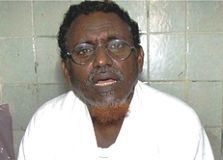Somali Islamists warn Ethiopia of ‘full-scale war’
Aug 24, 2006 (MOGADISHU) — Islamist militias controlling much of southern Somalia warned Ethiopia on Thursday of “full-scale war” unless it withdraws troops allegedly sent to defend the country’s weak transitional government.
 The warning was delivered as forces loyal to the increasingly powerful Islamist movement advanced toward a town north of the capital captured earlier this week by warlords reportedly backed by Ethiopian soldiers.
The warning was delivered as forces loyal to the increasingly powerful Islamist movement advanced toward a town north of the capital captured earlier this week by warlords reportedly backed by Ethiopian soldiers.
“We say again that Ethiopian intervention in Somalia will never be accepted,” said Sheikh Hassan Dahir Aweys, the hardline leader of the Supreme Islamic Council of Somalia (SICS).
“We call on Ethiopia to withdraw its forces from Somalia, otherwise be ready for full-scale war,” he said at a ceremony in Mogadishu to mark the formal reopening of the city’s main seaport, closed 11 years ago.
“No one can dare divert us on to a path other than Sharia law,” added Aweys, a conservative cleric designated a terrorist by the United States for alleged links to Osama bin Laden’s Al-Qaeda network.
Ethiopia has repeatedly denied deploying troops to Somalia despite numerous eyewitness accounts of uniformed Ethiopian forces arriving in the country since last month to protect the government from feared Islamist attacks.
Addis Ababa has rejected the persistent claims as propaganda, but is deeply concerned about the rise of the Islamists on its eastern border and has pledged to defend itself and the Somali administration from any Islamist threat.
“There are no Ethiopian troops in Somali territory, such wolf cry from Aweys is intended to make Ethiopia a focal point for his hidden motives,” the foreign ministry spokesman Solomon Adebe told AFP in Addis Ababa.
“Such sheer lies will not make Ethiopia shy away from its principle of seeing peace in Somalia and to respect the independence and territorial integrity of Somalia,” he said.
Addis Ababa’s role has sparked concerns Somalia may become a proxy battleground for Ethiopia and arch-foe Eritrea, which is suspected of supplying weapons to the Islamists and accuses Ethiopian officials of planning to invade.
The most recent report of Ethiopian involvement in Somalia came Tuesday when locals said Ethiopian soldiers helped secular militia chase Islamic fighters from the village of Bandiiradley, near the town of Galkayo, about 620 kilometers (385 miles) north of Mogadishu.
As Aweys spoke in the capital, several hundred heavily armed Muslim fighters rolled into and occupied the town of Duol, about 40 kilometers south of Galkayo and were girding for battle, residents said.
“Some 700 Islamic fighters armed with machine guns and battlewagons came in but there was little resistance,” said Duol resident Abdulaziz Ahmed Guled. “They made it clear that they want to establish Islamic courts.”
He and others said they feared the Islamists were preparing to fight the warlords in Bandiiradley and expand their territory further north into Galkayo and the semi-autonomous northeastern region of Puntland.
Meanwhile, Galkayo residents said forces loyal to ex-Mogadishu warlords, who were driven out of the capital in June by the Islamists after months of fierce fighting, were getting set to meet the Islamist advance at Duol.
Thursday’s developments followed the Islamists’ launch this week of a formal military training facility for its fighters as they move to cement their authority, posing a growing threat to the internationally backed government.
Since seizing Mogadishu from warlords three months ago, the Islamic movement has rapidly expanded areas under its control and begun to enforce strict Sharia law, sparking fears of Taliban-style takeover of Somalia.
Somalia has been without a functioning central authority since the 1991 ousting of strongman Mohamed Siad Barre plunged the Horn of Africa nation of some 10 million into chaos with rival warlords battling for control.
The current government, the 14th attempt at restoring stability to the nation, was formed in Kenya in 1994 but has been riddled by infighting and has been unable to assert control over much of the country.
(ST/AFP)
